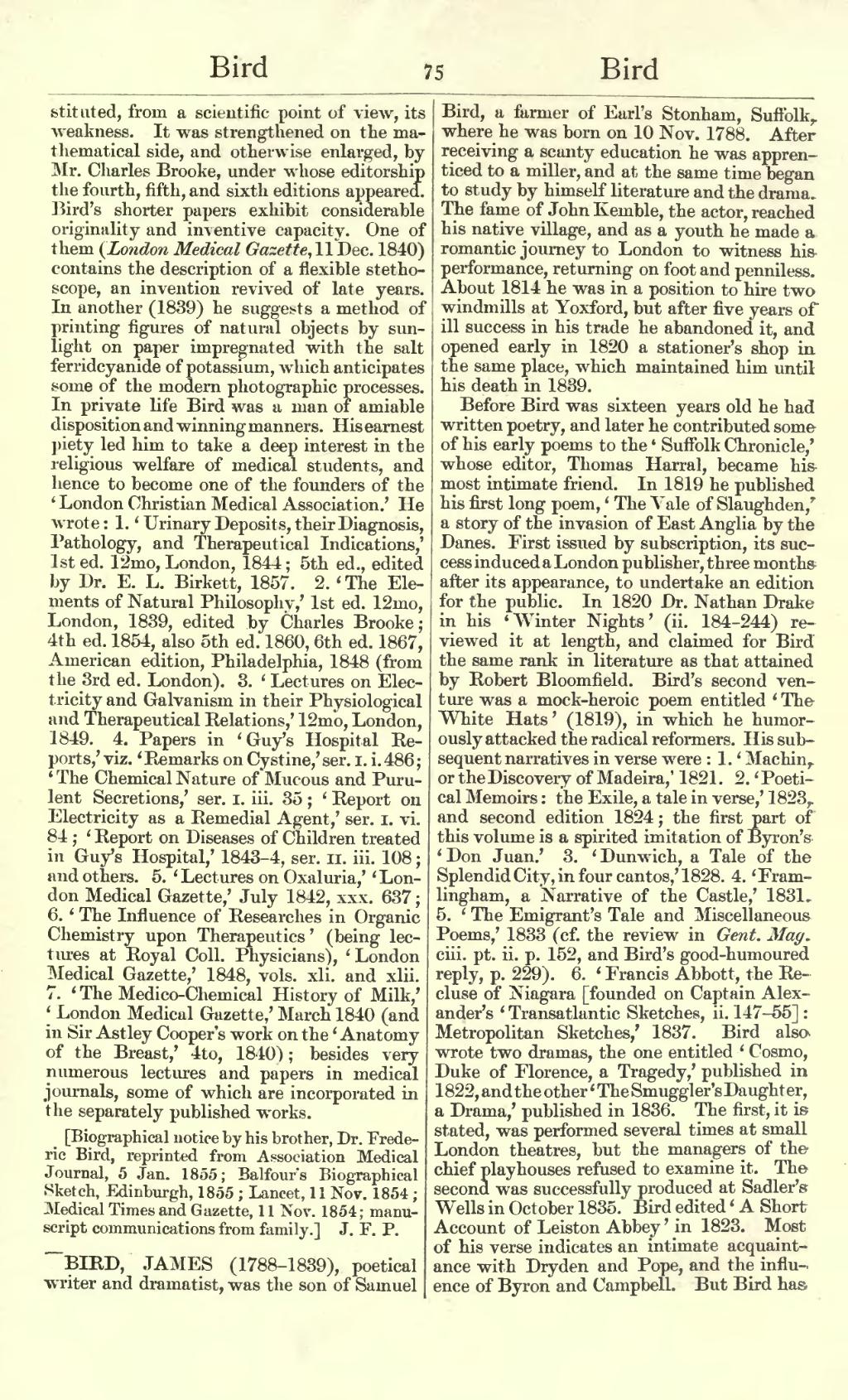stituted, from a scientific point of view, its weakness. It was strengthened on the mathematical side, and otherwise enlarged, by Mr. Charles Brooke, under whose editorship the fourth, fifth, and sixth editions appeared. Bird's shorter papers exhibit considerable originality and inventive capacity. One of them (London Medical Gazette, 11 Dec. 1840) contains the description of a flexible stethoscope, an invention revived of late years. In another (1839) he suggests a method of printing figures of natural objects by sunlight on paper impregnated with the salt ferridcyanide of potassium, which anticipates some of the modern photographic processes. In private life Bird was a man of amiable disposition and winning manners. His earnest piety led him to take a deep interest in the religious welfare of medical students, and hence to become one of the founders of the 'London Christian Medical Association.' He wrote:
- 'Urinary Deposits, their Diagnosis, Pathology, and Therapeutical Indications,' 1st ed. 12mo, London, 1844; 5th ed., edited by Dr. E. L. Birkett, 1857.
- 'The Elements of Natural Philosophy,' 1st ed. 12mo, London, 1839, edited by Charles Brooke; 4th ed. 1854, also 5th ed. 1860, 6th ed. 1867, American edition, Philadelphia, 1848 (from the 3rd ed. London).
- 'Lectures on Electricity and Galvanism in their Physiological and Therapeutical Relations,' 12mo, London, 1849.
- Papers in 'Guy's Hospital Reports,' viz. 'Remarks on Cystine,' ser. I. i. 486; 'The Chemical Nature of Mucous and Purulent Secretions,' ser. I. iii. 35; 'Report on Electricity as a Remedial Agent,' ser. I. vi. 84; 'Report on Diseases of Children treated in Guy's Hospital,' 1843-4, ser. II. iii. 108; and others.
- 'Lectures on Oxaluria,' 'London Medical Gazette,' July 1842, xxx. 637;
- 'The Influence of Researches in Organic Chemistry upon Therapeutics' (being lectures at Royal Coll. Physicians), 'London Medical Gazette,' 1848, vols. xli. and xlii.
- 'The Medico-Chemical History of Milk,' 'London Medical Gazette,' March 1840 (and in Sir Astley Cooper's work on the 'Anatomy of the Breast,' 4to, 1840);
besides very numerous lectures and papers in medical journals, some of which are incorporated in the separately published works.
[Biographical notice by his brother, Dr. Frederic Bird, reprinted from Association Medical Journal, 5 Jan. 1855; Balfour's Biographical Sketch, Edinburgh, 1856; Lancet, 11 Nov. 1854; Medical Times and Gazette, 11 Nov. 1854; manuscript communications from family.]
BIRD, JAMES (1788–1839), poetical writer and dramatist, was the son of Samuel Bird, a farmer of Earl's Stonham, Suffolk, where he was born on 10 Nov. 1788. After receiving a scanty education he was apprenticed to a miller, and at the same time began to study by himself literature and the drama. The fame of John Kemble, the actor, reached his native village, and as a youth he made a romantic journey to London to witness his performance, returning on foot and penniless. About 1814 he was in a position to hire two windmills at Yoxford, but after five years of ill success in his trade he abandoned it, and opened early in 1820 a stationer's shop in the same place, which maintained him until his death in 1839.
Before Bird was sixteen years old he had written poetry, and later he contributed some of his early poems to the 'Suffolk Chronicle,' whose editor, Thomas Harral, became his most intimate friend. In 1819 he published his first long poem, 'The Vale of Slaughden,' a story of the invasion of East Anglia by the Danes. First issued by subscription, its success induced a London publisher, three months after its appearance, to undertake an edition for the public. In 1820 Dr. Nathan Drake in his 'Winter Nights' (ii. 184-244) reviewed it at length, and claimed for Bird the same rank in literature as that attained by Robert Bloomfield. Bird's second venture was a mock-heroic poem entitled 'The White Hats' (1819), in which he humorously attacked the radical reformers. His subsequent narratives in verse were:
- 'Machin, or the Discovery of Madeira,' 1821.
- 'Poetical Memoirs: the Exile, a tale in verse,' 1823, and second edition 1824; the first part of this volume is a spirited imitation of Byron's 'Don Juan.'
- 'Dunwich, a Tale of the Splendid City, in four cantos,' 1828.
- 'Framlingham, a Narrative of the Castle,' 1831.
- 'The Emigrant's Tale and Miscellaneous Poems,' 1833 (cf. the review in Gent. Mag. ciii. pt. ii. p. 152, and Bird's good-humoured reply, p. 229).
- 'Francis Abbott, the Recluse of Niagara [founded on Captain Alexander's 'Transatlantic Sketches, ii. 147-55]: Metropolitan Sketches,' 1837.
Bird also wrote two dramas, the one entitled 'Cosmo, Duke of Florence, a Tragedy,' published in 1822, and the other 'The Smuggler's Daughter, a Drama,' published in 1836. The first, it is stated, was performed several times at small London theatres, but the managers of the chief playhouses refused to examine it. The second was successfully produced at Sadler's Wells in October 1835. Bird edited 'A Short Account of Leiston Abbey' in 1823. Most of his verse indicates an intimate acquaintance with Dryden and Pope, and the influence of Byron and Campbell. But Bird has
